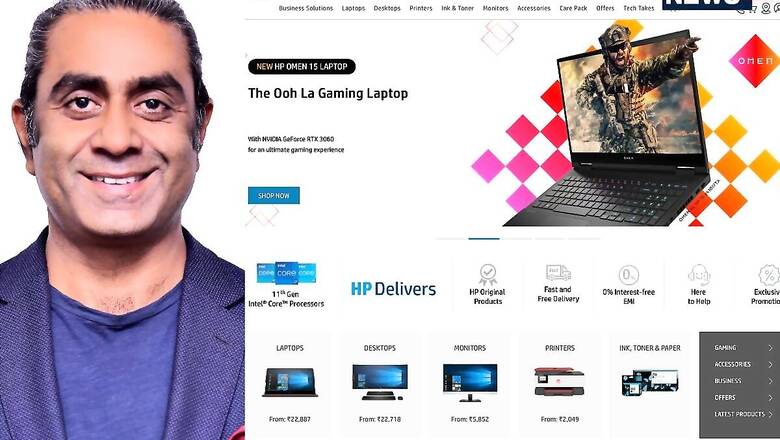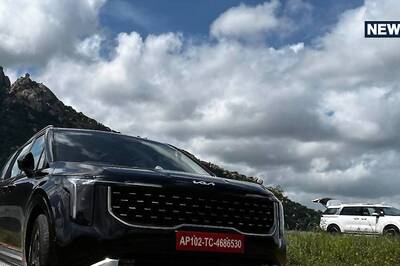
views
The believers always knew this would happen. The naysayers had talked up the case of smartphones and tablets as replacements. The debate that’s been raging for years, about whether laptops and PCs were no longer essential as before, has been turned on its head. The last 12 months and a bit more, as the world struggled to come to terms with the Coronavirus pandemic, have given PCs and laptops their rightful place in the hierarchy of computing devices. No longer, and most of us realize it to the fullest, can we manage with a tablet that has a bolted-on keyboard or a smartphone when the serious work comes around. The numbers more than confirm that, and the momentum is continuing. A laptop or desktop has effectively shut down the fantasy of phones and tablets replacing proper computing devices, and PC makers including HP India have taken full advantage.
The data from research firm IDC suggests that shipments for tradition PC form factors increased 73.1% year-in year in Q1 2021 compared with Q1 2020. A total of 3.1 million units were shipped with HP sitting pretty at the top of the charts with a market share of 32.9% ahead of Dell which has a 21.8% market share. News18 spoke with Vickram Bedi, Senior Director, Personal Systems at HP India to understand the PC landscape as it is unfolding, what sort of user preferences are coming to the fore and how businesses as well as consumers are coming to terms with a changing environment where hybrid work models are expected to be the norm in the times to come. Bedi points out that from a time where one PC per home was common, we have evolved into a scenario where one PC per individual is the only way to get work and virtual classrooms ticked off on a daily basis. Edited excerpts here.
Q: One of the few bright spots from last year has to be the fillip in sales of laptops and PCs as people scrambled to work from home. In your opinion, what would be the key takeaways from how people purchased laptops and PCs last year?
Over the last year, the world that we knew has changed. From working and learning remotely to finding new ways to entertain ourselves, things have changed dramatically. The PC is at the heart of this transformation, for it has proven to be the only device that has been capable to perform any role demanded of it in the new normal. As a result, we are now looking at a One PC per Individual scenario rather than one PC per family.
This shift has been led by the transition to the ‘stay at home economy’. From ensuring business continuity management and digitalising SMBs to supporting online learning and gaming culture, consumers are now more attentive about the products they invest in. Thus, our innovation led approach brings devices tailor-made for specific requirements of our end-users. With people connecting remotely, security, mobility, and collaboration are playing a key role in influencing the purchase decision of the end users, rather than price.
Q: Were there any interesting buying trends or demographics that were noticed? Were there any specific devices or price bands that saw most traction?
Customers have dramatically altered how they research and buy technology and how they engage with brands. Buying more products and services through digital channels, such as e-commerce, partner portals and marketplaces has evolved drastically. At the same time, technology and digital transformation are advancing at an astounding pace. As a result, business models are shifting from simple transactions focused on selling products, to contractual relationships. Today’s buyer expects streamlined, automated and personalized experiences. To thrive in this changing environment – we are working with data as the new currency. This also requires a shift in our approach to our customers as individuals, not markets. Trends show that businesses are increasingly embracing service-led and managed services rather than static transactional product purchases. Customers are placing a greater value on technology vendors and partners that can anticipate their needs and provide holistic solutions.
Q: With classes going online, what sort of laptops and PCs were parents considering and demanding the most?
The ongoing situation has brought in a significant change in the way families use PCs. E-learning and digital education will now become a part of our education system, even after schools and colleges re-open. As a result, educators, educational institutes, and students will adopt technology to ensure uninterrupted learning.
With virtual classrooms and learning from home, we are seeing enhanced demand across segments to support diverse learning needs. Apart from devices, there will also be a need for curriculum delivery and learning management systems to truly transition towards new age smart classroom solutions to support fluid or hybrid learning models. HP is working with its partners to bring these solutions to India that have the potential to transform the education sector in the country.
Q: Do the sales figures indicate more of a trend of adding another laptop to the existing arsenal at home or one laptop that would serve multiple tasks and be shared among family members?
The current situation has established PCs as essential devices. While the severity of the pandemic will vary in different parts of the world, we feel that the hybrid mode of working and learning remotely will be the future. We are also noticing consumers are now adding bigger displays and desktops in their home set up as they offer better ergonomic benefits. Last year, the demand was largely from commercial segment but demand from individual buyers has picked up significantly. The biggest contributor to this demand from individual consumer is led by online learning as millions of young students are continuing their education remotely.
Q: Please tell us about HP’s initiatives for the virtual classrooms and the digital education patterns that we will see in the coming months and years. What are and will be the big challenges?
The PC has never been more essential in education especially with blended learning becoming the norm after the pandemic. Educators and parents are looking for devices that are flexible and powerful for creating and collaborating anywhere. E-learning and digital education will now become a part of our education system, even after schools and colleges re-open. As a result, educators, educational institutes, and students will adopt technology to ensure uninterrupted learning.
At HP, we believe in building a dynamic, engaging and inclusive ecosystem of learning. We want to prepare the next generation for the future of work and set them on a new course for lifelong learning. HP is delivering technology solutions aimed at fostering connectivity and collaboration, allowing teachers to discover innovative ways of engaging their students and them enjoying a more meaningful and comprehensive learning experience. This sudden demand for a sustained period has put some pressure on supply chain operations across the world. Additionally, the second wave has triggered some distribution and availability issues due to movement restrictions being imposed in the country.
Q: Building on a strong 2020, what will be HP’s focus this year?
HP has always believed in ‘insight-based innovation’, where we try and understand our customers as best as they can country by country, city by city. We study customers and markets to understand how they are using technology, what pain points do they have, and which technology can solve. These insights allow us to map their needs and then converting those insights into products and features. Our recent line up of product launches has been reflective of this. Our strong consumer business is a clear advantage for us, as the shift to remote work and school continues to create momentum. The PC is more essential to daily life than ever before, and demand for our innovation remains strong.
Among corporates, more people will work from home permanently. A majority of businesses will gravitate to the hybrid model. Mobility is critical, even if you work from home. People work from an average of 2 or more locations at home, as they roam around to find scarce resources – bandwidth and peace from distraction, whether be it pets or children. As we continue working from home, having an in-built data connection became a necessity as it eliminates the need to rely on unsecure Wi-Fi or hotspots, while making the PCs more secure. Keeping this in mind we introduced the HP 14s notebook with an embedded 4G LTE module, which lets consumers enjoy faster internet and thereby increased productivity.
Q: Will this be a year of consolidation or simply to strike while the iron is hot and introduce revolutionary computing devices and form factors?
We expect to see continued PC unit growth in 2021, driven primarily by education, gig workers and gaming segment. This demand which we anticipate will create additional opportunities for us to drive profitable growth, as well as grow the lifetime value of our installed base by broadening our ecosystem of peripherals and services.
Q: Which product lines and genres will HP focus most on this year? How important will be the price vs specs debate with these?
Our key focus for 2021 will be on education, gaming and creators’ segment as we foresee a strong growth in these areas. In addition, many conversations with our customers are around wellness now. They need PCs to be lighter so they can move with their PC around their homes. As the workforce transit to working from home, from planes, from cafés, we need more mobility, as we move through 2021. Security, mobility, and collaboration are now playing a key role in influencing the purchase decision of the end users, rather than price.
Q: The Chromebook line-up is something HP has focused on consistently, unlike a lot of the rival brands? How as the consumer response been to these laptops?
HP is the number one Chromebook vendor in the world. Catering to the early learners from class 2-7, HP’s new family of education edition Chromebooks are simple, secure and shareable devices that enable schools and educators to empower the next generation with skills to master creativity, collaboration and critical thinking. While we don’t give break ups of individual category, but we can share that the demand for Chromebook devices has been extremely strong and that has led us to diversify our Chromebook portfolio to cater to new user segments.
Q: Has the semiconductor shortage in any way impacted the production lines, and do you see that impacting availability of laptops in the coming months?
While the chipset shortage is impacting several sectors including PCs we are constantly working on ways to ensure smooth supply of products and devices to our end users.
Read all the Latest News, Breaking News and Coronavirus News here.



















Comments
0 comment